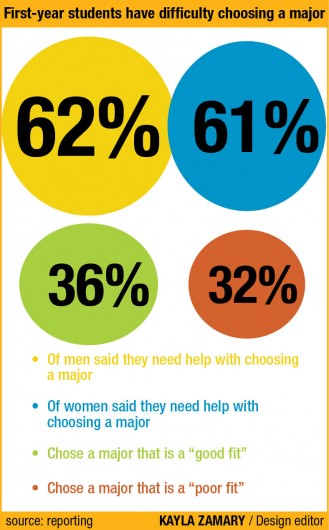The majority of college freshmen felt they needed help from advisers to choose majors and career plans, a higher percentage than researchers expected, according to a recent study.
Nearly one-third of this year’s national freshman class planned to major in something that was a “poor fit,” according to a study released this month by ACT, a nonprofit organization that aims to help people achieve education and workplace success. The 2013 ACT College Choice Report looked at the majors nearly 1.8 million 2013 high school graduates chose in comparison with their interest levels in those fields.
The information from the report comes from the 2013 ACT-tested high school graduating class and was collected when the high school students registered for the ACT.
About 36 percent of students who selected a planned major chose something that was a “good fit with their interests,” according to the report, while about 32 percent selected a major that was considered to be a “poor fit with their interests.”
Meanwhile, about 62 percent of men and 61 percent of women said they felt they needed assistance from their chosen college to decide their major and career plans.
Steve Kappler, ACT’s assistant vice president for career and college readiness, said that percentage was larger than expected.
“We have a lot of work to do to have these conversations sooner and make them more real for students to help them align themselves with the right career. I didn’t realize the number of students that really needed these conversations,” Kappler said.
Some Ohio State students agreed that those conversations would be helpful in the major-decision process.
“I would expect that because 18, 19 and 20-year-olds are still not sure what they want to do with their lives, they pick a major or something that seems interesting or what they were good at in high school,” said Brian Hoffer, a fourth-year in microbiology.
The study found that more women had selected a planned major and were “very sure” of their planned major choice.
Macy Araps, a second-year in business who switched majors this year, said she had trouble finding her passion at first.
“I knew there were a lot of job opportunities in engineering, especially for females, but I ended up hating it. I like business better, my classes interest me more,” Araps said.
OSU’s University Exploration program aims not to place judgment on students based off their priorities for picking a major, said Glenn Ireland, an academic counselor in University Exploration.
He said it is important for students not to focus solely on their major but also on the other factors employers look at when they apply for a job.
“You want to think abut your interests, your strengths, your goals and how those line up with careers. What is at the intersection of all those things?” Ireland said.
This was the first year the ACT report focused on majors specifically and looked at what majors students said they would pursue in comparison with where their interests actually fell. It is also the first large-scale study of its type, Kappler said.
“This is really about helping people find their passion. I’m fortunate that I found mine, and we need to get more people to find that same measure of passion,” Kappler said.



